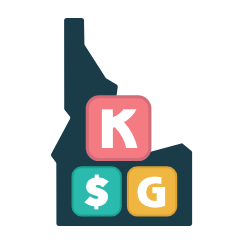 The Idaho Commission for Libraries offers a grant to build the capacity of Idaho public libraries to better prepare preschool children to be successful in school. The Kindergarten Readiness grant provides state funding to help public libraries partner with their local school districts and other community partners to reach children and their families before they enter school.
The Idaho Commission for Libraries offers a grant to build the capacity of Idaho public libraries to better prepare preschool children to be successful in school. The Kindergarten Readiness grant provides state funding to help public libraries partner with their local school districts and other community partners to reach children and their families before they enter school.
Libraries play an important role in early childhood success through the expertise of trained librarians, early literacy programs, books, and digital tools that many families can’t afford on their own. Children who start school behind rarely catch up with their peers without costly direct reading intervention. Children who have been exposed to early literacy practices before they enter school are more likely to become successful readers throughout their years of schooling.
Apply for grant funds to
- Ensure that more Idaho families with pre-kindergarten children have public library cards to gain access to the tools and resources needed to help children succeed in school, especially for families with limited access to preschool programming or who are not regular library users;
- Increase the amount of early literacy activities done in the homes of pre-kindergarten children across the state; and
- Increase the number of successful public library, school, and community partnerships that increase third-grade reading proficiency by focusing on pre-kindergarten experiences, especially for underserved children
At your library. Libraries are trusted, welcoming places where children make discoveries, expand words and knowledge, and connect their natural curiosity to the world. Libraries level the playing field for children of all income levels, providing free and accessible learning opportunities that help prepare young children for school.
However, many families in Idaho, especially those of lower socioeconomic levels, are not accessing books and other learning opportunities from their local library. Behind from the start. Idaho State Department of Education statistics from the fall of 2017 indicate that almost 63% of low-income children (those qualifying for free or reduced lunch) entered kindergarten with less than a proficient level of literacy readiness.
Research shows that children who start behind will stay behind and in many cases, continue to lose ground, making it more likely they will need costly remediation, be retained, or even drop out of school.
From Growing Young Minds: How Museums and Libraries Create Lifelong Learners, 2013:
It takes a village. Research provides strong evidence of the critical importance of community- or place-based efforts in supporting children’s growth and development, especially in the earliest learning years. Local conditions can have a major impact on whether children succeed, and challenges must be addressed within the context of the community to assure effective solutions are reached. To that end, communities across the nation are coming together to develop plans to address problems and put policy strategies into action.
At the heart of these efforts is an understanding that real change will only be accomplished through broad-based, multi-sector collaboration. Libraries are well-positioned to be integral parts of coordinated efforts, but are too often untapped or disconnected resources in community efforts to support more positive outcomes for families and children.
Librarians are important facilitators of learning: they are anchoring their practices in research and partnering with other community service providers to provide high-quality, informal learning opportunities; and they are creating environments, programs, and experiences that expand and deepen the abilities of our youngest learners, their families, and caregivers. In turn, communities are beginning to recognize that libraries are key components of their early learning infrastructure, and school leaders are recognizing that engaging public and school librarians can improve children’s outcomes in school.
The Idaho Commission for Libraries’ Kindergarten Readiness Grant supports library-led, community-based efforts to:
- Increase high-quality early learning experiences
- Increase access to library services (books, materials, and digital resources) for underserved children and their families
- Engage and support families as their child’s first teacher
- Create multi-level approaches that advance third-grade reading proficiency and promote kindergarten readiness
- Address the Summer Slide
- Link digital technology to learning
- Leverage community partnerships
- Add capacity to early learning networks
There are many exciting projects, partnerships, models, and best practices currently taking place in communities nationwide (see Resources and Examples below). Whether you are building on existing early learning partnerships, or thinking of new ways to collaborate to serve your preschool families, this grant funding will support high-quality, innovative, and impactful projects that increase the number of children entering kindergarten ready to learn.
Grant Eligibility
Only Idaho public libraries may apply. Applications will be ranked by the applicants’ responses to the weighted grant application questions and include: the needs of the community; the strength of the partnerships and commitment to carry out the grant plan; the initial plan to reach pre-kindergarten children in the library’s service or impact area especially underserved children; ability to measure the project’s success/impact; and budget description. The ranking committee may also take into consideration the geographical distribution across the state. Please see application packet under Grant Application for more details.
Two types of grants:
Kindergarten Readiness Standard Grant: Awards of up to $10,000, in increments of $1,000
Who can apply?
- Libraries applying for the first time, or that have never been awarded a K Ready Grant from ICfL
- Libraries that received a K Ready Grant in previous years, and are proposing a NEW project (can apply at least three years from original award)
K Ready-Set-Go Minigrant: Awards from $500 to $5,000, in increments of $500
Who can apply?
- Libraries that received a K Ready Grant in previous years can apply to fund the continuation of a current or past grant project
- Libraries interested in funding a project identified as a “Best Practices Model”
Best Practices Models: Projects based on proven and evaluated models that support early learning/school readiness
- The continuation, extension, and/or enhancement of a project funded by an ICfL Kindergarten Readiness Grant in previous years;
- Replication of a My First Books program coordinated and implemented in-house;
- Establish a “Learning in Everyday Spaces” location, such as in a laundromat, health clinic, food distribution site, etc., based on ICfL’s Libraries and Laundromats program;
- Host “Ready for Kindergarten!®” workshops at the library or through outreach;
- Host Every Child Ready to Read® family workshops at the library or through outreach;
- Other “best practices” models approved by ICfL (must contain vetted evaluation tool, include an active community partnership, and meet the three identified goals for K Ready Grants).
Grant Requirements 2023-2024
Grant period: September 15, 2023 – June 1, 2024
Goals: Grant projects must meet the program goals, listed above.
Training and Support: Library staff and partners will be required to attend a webinar to review grant requirements and share information about project plans with other grant recipients (date to be determined). If you can’t attend the live webinar, viewing the recorded version is required. An ICfL consultant will also be assigned to provide assistance and technical support throughout the grant cycle.
Documentation: Complete an interim report and a final report
Projects must include the following components:
- Focus on children who have not yet entered kindergarten;
- Include a parent education and/or engagement element;
- Include a plan for reaching underserved children and families (those not already utilizing library services);
- Establish (or maintain) an active partnership with a school or community organization.
- Evaluation of project components using formal evaluation tool
Allowable Expenditures:
- Evaluation tools; commercial (such as Get Ready to Read screeners) or developed and printed in-house
- Programs focused on school readiness for pre-kindergarten children that provide blended learning opportunities (i.e. time to socialize with peers, hands-on learning opportunities, and introductions to digital learning tools)
- Parent/caregiver workshops: Designed by library, or use of trademarked workshops, such as Ready! for Kindergarten™
- Outreach events; taking early learning programming to where young children and their families gather
- Virtual events; providing early learning programming or parent/caregiver workshops in an online format
- Consumable educational materials for families to use at home to build early learning skills
- Educational materials that can be checked out for home or daycare use, to build early learning skills
- Creating active early learning spaces within the library setting that promote family engagement
- Devices and mobile hot spots for families to check out, in order to access early learning resources externally
- Dedicated children’s computers or devices for the library to facilitate early learning resources internally
- Waiving overdue fines for children (not to exceed 25% of grant award)
- Non-resident library card fees
- Library card materials
- Public Relations materials; Facebook marketing
- Personnel, especially native Spanish-speakers, for programs and outreach
- Parent and family events (noting that food is not an allowable expense)
- Summer reading/out-of-school reading support
- Community audits/needs assessment or surveying parents of pre-kindergarten children
- Translation of materials/signage into other languages
- Other materials and/or services that will support your community plan to increase early literacy/school readiness
Non-allowable Expenditures:
- Grant funds spent on personnel cannot be used to fulfill regular institution salary costs. Personnel will be required to document time spent working on the grant project to verify that costs are true, accurate and not double-billed to the grant and normal operational costs.
- No more than 25% of the grant funds can be spent to waive overdue fines for children.
- Grant funds cannot be spent on construction or other capital improvements.
- Grant funds cannot be spent on food or snacks.
How to Apply:
Step 1: Consultation
Before you can apply for a Kindergarten Readiness grant you must engage in a verbal project consultation with the program coordinator, Staci Shaw. Contact Staci to schedule an appointment: staci.shaw@libraries.idaho.gov
Once the consultation is completed you will receive a link to the online grant application form, which will open July 25, 2023.
Step 2: Apply by August 24, 2023
- Read through the Application Instruction Packet for the chosen grant and use the worksheet included to begin drafting your responses:
GRANT GUIDELINES AND APPLICATION INSTRUCTIONS
Kindergarten Readiness Standard Grant: Word Doc PDF
K Ready-Set-Go Grant: Word Doc PDF
- You will submit the official application online at the link provided to you after your project consultation appointment. The application must be started and completed in one session; the form will not allow you to save and complete later.
- Partner Commitment Form: Each school* and/or community partner included in your project description is required to submit a form describing exactly what their role is in your grant project and how they will help you meet the goals of the grant. Forms are due August 24, 2023 and can be accessed at this link: Community Partner Form for K Ready Grants
*Keep in mind that most school/district staff are unavailable in the month of July.
| 2023 |
|---|
| May 22 – August 21: Grant consultation period open July 1, 2023 – August 24, 2023: Application open September 14: Grant applicants notified about their status via email September (TBD): Grant recipients attend webinar, grant funds distributed to library September 15: Grant period begins |
| 2024 |
|---|
| January (TBD): Interim report due June 1: All funds must be spent, Final reports due |
Coming soon
If you have questions about the grant application or the application process, please contact Talela Florko, Grants/Contracts Officer, at libgrants@libraries.idaho.gov or Staci Shaw, Youth Services Consultant, at staci.shaw@libraries.idaho.gov or by phone at 1-800-458-3271.

